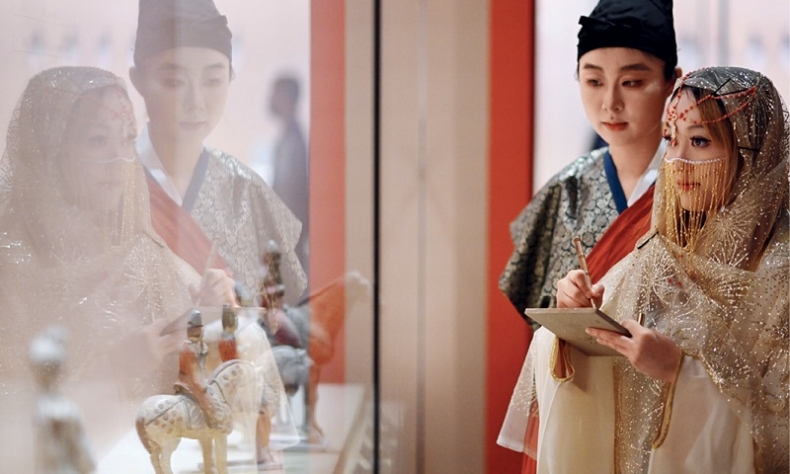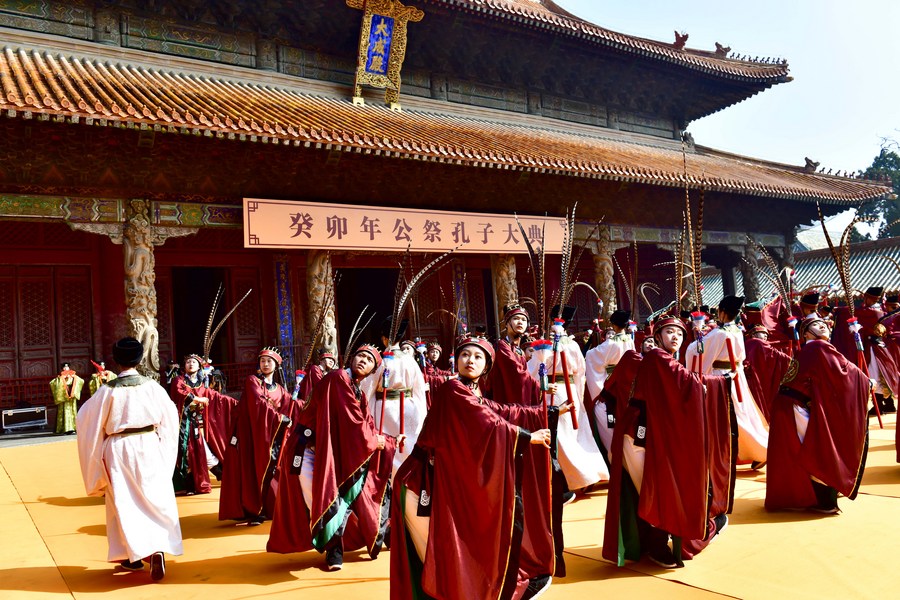China’s Traditional Values: Trust and Harmony

Building trust and seeking harmony should be the guiding principle for promoting friendly exchanges and win-win cooperation between different civilizations.
The term “jiang xin xiu mu”(讲信修睦), literally meaning to build trust and seek amity, conveys an ancient Confucian ideal for society and policy. Today it has become an important concept in China’s ancient treasure chest of wisdom that helps shape the Chinese culture and society. President Xi Jinping has shared this idea on various occasions. For instance, when he addressed the opening ceremony of the Plenary Session of the Sixth Eastern Economic Forum on September 3, 2021, he said, “China has started a new journey toward fully building a modern socialist country. We are ready to work with all parties to uphold true multilateralism, advocate trust and harmony, promote win-win cooperation, and march with firm steps toward the goal of building a community with a shared future for mankind.”
The phrase can be traced back to the Book of Rites written during the first century B.C. It has since become an essential element of the Chinese cultural gene, giving the Chinese people a genial, peaceful disposition and exerting a profound impact on Chinese politics, economy, society, and culture.
Building trust and seeking harmony helps lay the foundation of personal ethics. As for what constitutes people’s personal values, the answer differs from person to person. To some wealth is most important, others it may be power, and still others it may be fame. Confucius’ answer to this question, however, was trustworthiness. As a carriage without a shaft cannot move around, a person who has not won the trust of those around him has no rightful place in society, the ancient sage said. Despite the fact that people of different nations, ethnicities, and cultures throughout the history have lived their lives based on different ethical standards, trustworthiness has always been a quality valued by all. According to ancient Chinese, this characteristic, first of all, comes from keeping one’s promises and maintaining honesty.
Ji Zha (576-485 B.C.) was an aristocrat of the State of Wu, a kingdom in south China from the 12th to the fifth century B.C. During a diplomatic mission to the State of Lu, he made a stopover in the State of Xu, and met with its ruler. Seeing the ruler’s admiration for his sword, Ji decided to gift it to him after the mission was completed. The ruler however died of illness before Ji returned. When Ji passed through the State of Xu, he hung his sword on a tree near the ruler’s tomb. “What’s the point of leaving your sword here since the ruler has died already?” a member of his entourage asked. “I made the promise to myself that I would bestow it to His Grace. How could I go against my conscience even if he is now dead?” Ji replied. For a true gentleman like Ji Zha, once they have made a promise, whether audibly spoken or unspoken, they must keep it under all circumstances.
Building trust and seeking harmony is also critical to unifying a community and society at large. Guan Zhong (?-645 B.C.), a minister of the State of Qi, spearheaded reforms that propelled Qi to dominance over the many small kingdoms of his time. He once made the following remarks, “Trust is the binder of the world.” Mutual trust brings people together, creates a sense of belonging, and helps maintain peace and order across society.
The Taoist text Liezi (attributed to Lie Yukou, a fifth century B.C. philosopher) tells a story about suspicion and misconception. In the story, a farmer lost his hatchet and subsequently became suspicious of his neighbor’s boy. With such suspicion lingering in his mind, he deemed everything the boy did to be dubious. Some days later, he found the tool in his field, and then he no longer saw the slightest trace of a thief in the boy. Obviously it is not the boy who has changed, rather it is the farmer’s perception of him which has changed. This story is still relevant in our time when trust between people is in decline. In a society devoid of trust, every member is the victim.

Building trust and seeking harmony are two keys to establishing the credibility of a government and stability of a state. The ancient Chinese philosophical text, Analects, records a conversation about governance between Confucius and his disciple Zi Gong. The Master believed that enough food and weapons together with the trust of the people are critical to good governance. Zi Gong asked, “Suppose you have no alternative but to give up one of these three, which one would you let go of first?” The Master replied, “Weapons.”
Zi Gong asked again, “What if you have to give up one of the remaining two, which one would it be?” The Master said, “Food. From ancient times, death comes to all, but if people don’t trust the government, the country can’t stand.” In the view of the ancient sage, the trust of the people is of more importance to a government than military power and economic strength.
Countless stories from history exhibit the truth that countries succeed by winning public trust and fail when they lose it. Shang Yang (390-338 B.C.) was an adamant reformer in the State of Qin. On one occasion, to demonstrate his determination to enact a new law, Shang Yang had a wooden pole erected at the southern entrance to a market, and promised an award of 10 gold ingots to anyone who could move it to the northern entrance. But no one took him seriously. He then raised the reward to 50 gold ingots. Doubtfully, a man stepped forward and carried the log to the designated place. In front of a crowd of onlookers, he received the promised gold. As news of this incidence spread across the kingdom, support for the reform surged. Eventually Qin became strong enough to annex other states and unite China.
Building trust and seeking harmony should be the guiding principle for promoting friendly exchanges and win-win cooperation between different civilizations and countries. For centuries China was one of the most powerful empires in the world. It has however never adopted the concept that once a country becomes strong enough, it will invariably seek hegemony. China understands the lesson of history – that hegemony preludes decline. This is why it has never colonized or invaded other states.
During the second century B.C., the Western Han Dynasty diplomat Zhang Qian (164-114 B.C.) established friendly ties between China and Central Asian countries, and in the process initiated the ancient Silk Road connecting Asia with Europe. In the following millennia, numerous stories of mutual respect, mutual trust, and mutual learning unfolded along this passage of international trade and exchange. During the early 15th century, the famous Ming Dynasty navigator Zheng He (1371-1433) made seven voyages to Southeast Asia, India, Arabia and even to the far-flung shores of East Africa. Although he commanded the most advanced fleet the world had ever seen, the Chinese envoy did not seize one inch of land from other countries, and was therefore greeted by cheering crowds wherever he went ashore. This stood in sharp contrast with European colonists in Africa, America, and Asia.
Today our world, our times, and history are changing in a way no one has ever seen before, and how to solve problems affecting development, security, and governance is a great challenge for human conscience and wisdom. As we look into the future, we hope that the Chinese tradition of building trust and seeking harmony will be passed on to future generations and shared by all people around the world, inspiring us to work together in building a global community of shared future.
Song Ying is a researcher with China Confucius Research Institute.
 Facebook
Facebook
 Twitter
Twitter
 Linkedin
Linkedin
 Google +
Google +










